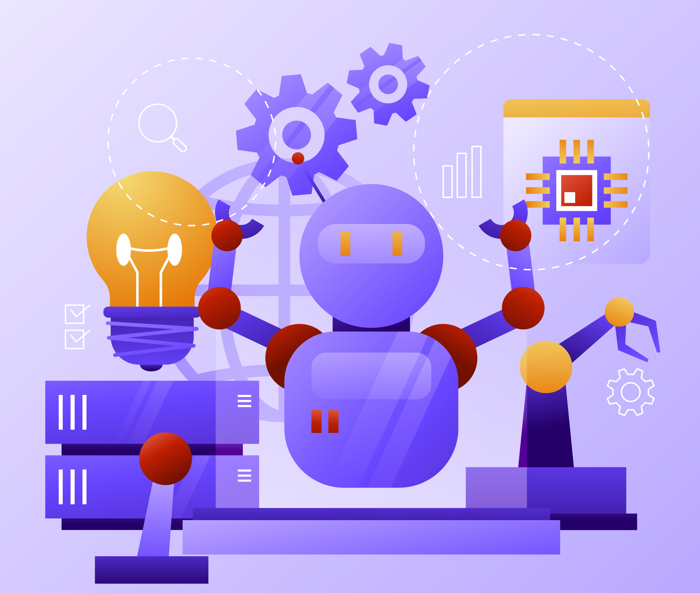In today’s world, decision-makers face increasingly complex and uncertain environments. From business leaders charting strategic directions to policymakers shaping public policies, the ability to make informed decisions is paramount. Generative Artificial Intelligence (AI) has emerged as a powerful tool in this context, offering unprecedented capabilities to analyse data, simulate scenarios, and generate insights. This blog explores the evolving role of generative AI in decision-making processes across various domains and its potential to revolutionize how decisions are made.
In particular, AI chat platforms can facilitate real-time, interactive decision-making by providing instant access to data-driven insights and expert-level analysis, thereby enabling quicker and more informed choices.
Understanding Generative AI:
Generative AI refers to a class of artificial intelligence systems that can generate new content, such as images, text, or even entire simulations, based on patterns learned from existing data. Unlike traditional AI models that are designed for specific tasks, generative AI models can create novel outputs autonomously, often mimicking human-like creativity and problem-solving skills. This capacity makes them particularly well-suited for decision-making tasks where creativity, adaptability, and foresight are essential.
Enhancing Decision-Making Capabilities:
Generative AI is transforming decision-making processes in diverse ways, offering new avenues for analysis, prediction, and optimization. Here are some key ways in which generative AI is enhancing decision-making capabilities:
- Data Analysis and Pattern Recognition: Generative AI excels at analysing large volumes of data and identifying intricate patterns and relationships that may not be apparent to human analysts. By leveraging advanced machine learning and AI algorithms, generative AI can uncover hidden insights buried within complex datasets, providing decision-makers with a more comprehensive understanding of the underlying dynamics.
- Scenario Simulation and Forecasting: Generative AI enables decision-makers to simulate various scenarios and forecast potential outcomes based on different parameters and assumptions. By generating realistic simulations of future events, decision-makers can evaluate the potential impact of different strategies and interventions, enabling more informed and proactive decision-making.
- Risk Assessment and Mitigation: Generative AI can analyse historical data and identify potential risks and vulnerabilities within complex systems. By generating risk profiles and probabilistic forecasts, decision-makers can proactively identify and mitigate potential threats, thereby enhancing resilience and risk management capabilities.
- Decision Support and Optimization: Generative AI can assist decision-makers by generating alternative solutions and optimizing decision variables based on predefined objectives and constraints. By exploring a wide range of possible options and trade-offs, generative AI enables decision-makers to make more rational and evidence-based decisions, leading to better outcomes.
- Creativity and Innovation: Generative AI can stimulate creativity and innovation by generating novel ideas, designs, and solutions that may not have been considered otherwise. By leveraging generative AI as a creative tool, decision-makers can explore unconventional approaches and unlock new opportunities for growth and transformation.
Applications Across Domains:
Business and Finance: In the business world, generative AI is being used to optimize supply chain operations, develop new products and services, and improve customer engagement. By generating predictive models and market simulations, generative AI enables businesses to make data-driven decisions that drive growth and profitability.
- Healthcare and Medicine: In healthcare, generative AI is revolutionizing drug discovery, personalized medicine, and clinical decision support. By analysing vast amounts of patient data and medical literature, generative AI can assist healthcare professionals in diagnosing diseases, predicting treatment outcomes, and designing tailored treatment plans.
- Urban Planning and Transportation: In urban planning and transportation, generative AI is being used to optimize traffic flow, design sustainable cities, and improve public transportation systems. By generating urban simulations and mobility models, generative AI enables policymakers to make informed decisions that enhance efficiency, safety, and sustainability.
- Environmental Conservation: In environmental conservation, generative AI is helping to monitor and manage natural resources, predict climate change impacts, and design conservation strategies. By generating ecological models and environmental simulations, generative AI empowers conservationists to make evidence-based decisions that protect biodiversity and ecosystem health.
- Future of Education: AI is profoundly shaping the future of education by revolutionizing how students learn, teachers teach, and institutions operate. With AI-powered adaptive learning platforms, personalized learning experiences are becoming the norm, catering to each student’s individual needs and learning pace. Intelligent tutoring systems leverage AI algorithms to provide real-time feedback and recommendations, enhancing student engagement and mastery of concepts. Additionally, AI-powered virtual assistants streamline administrative tasks for educators, freeing up time for more personalized interactions with students. Moreover, AI-driven analytics tools analyse vast amounts of educational data to identify trends, predict student outcomes, and inform instructional strategies. As AI continues to evolve, its role in education is poised to expand further, driving innovation, improving accessibility, and empowering learners of all ages and backgrounds to reach their full potential in the digital age.
Challenges and Considerations
Ethical and Bias Considerations: Generative AI models may inadvertently perpetuate biases present in the training data, leading to unfair or discriminatory outcomes. Decision-makers must carefully consider the ethical implications of using generative AI take steps to mitigate biases and ensure fairness and transparency.
- Data Quality and Privacy: Generative AI relies heavily on high-quality data to generate accurate and reliable outputs. Decision-makers must ensure the integrity and privacy of the data used to train and deploy generative AI models, taking appropriate measures to safeguard sensitive information and comply with data protection regulations.
- Interpretability and Trust: Generative AI models are often complex and opaque, making it challenging to interpret their outputs and understand the underlying decision-making processes. Decision-makers must strive to enhance the interpretability and transparency of generative AI models to build trust and confidence among stakeholders.
- Regulatory and Legal Frameworks: Generative AI raises novel regulatory and legal challenges related to intellectual property rights, liability, and accountability. Decision-makers must navigate evolving legal frameworks and regulatory requirements governing the development and deployment of generative AI technologies to ensure compliance and mitigate legal risks.
Conclusion:
Generative AI Potential Impacting Industries by providing decision-making processes, offering unprecedented capabilities to analyse data, simulate scenarios, and generate insights. By harnessing the power of generative AI, decision-makers can make more informed, proactive, and creative decisions that drive innovation, enhance resilience, and create value for society. However, realizing the full potential of generative AI requires careful consideration of ethical, legal, and regulatory considerations, as well as ongoing efforts to address challenges related to bias, interpretability, and data privacy. As generative AI continues to advance, its role in decision-making is likely to become increasingly central, shaping the future of how decisions are made in our increasingly complex and uncertain world.

